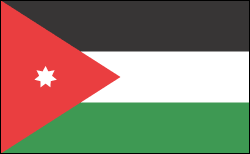- / Countries of the World
- / news and current events
Jordan News & Current Events

Index
- Jordan Profile
- History
- News and Current Events
Jordan Extends an Olive Branch to Former Foes
Jordan's stance during the Persian Gulf War strained relations with the U.S. and led to the termination of U.S. aid. The signing of a national charter by King Hussein and leaders of the main political groups in June 1991 meant political parties were permitted in exchange for acceptance of the constitution and the monarchy. King Hussein's decision to join the Middle East peace talks in mid-1991 helped restore his country's relations with the U.S.
In July 1994, King Hussein and the Israeli prime minister Yitzhak Rabin signed a declaration ending the state of belligerency between the two countries. A peace agreement between the two countries was signed on Oct. 26, 1994, although a phrase in it calling the king the “custodian” of Islamic holy shrines in Jerusalem angered the PLO. In the wake of the agreement, Jordan's relations with the U.S. and with the moderate Arab states, including Saudi Arabia, warmed. In 1997, Jordan, determined to attract foreign investment, began negotiating with the United States about membership in the World Trade Organization. In Jan. 1999, King Hussein unexpectedly deposed his brother, Prince Hassan, who had been heir apparent for 34 years, and named his eldest son the new crown prince. A month later, King Hussein died of cancer, and Abdullah, 37, a popular military leader with little political experience, became king.
The first parliamentary elections under King Abdullah took place in June 2003 and resulted in a two-thirds majority for the king's supporters. In 2005, the king, unhappy with the slow progress on reforms, replaced his cabinet.
Three suicide bombings by Iraqis blasted hotels in Amman, Jordan, in Nov. 2005, killing at least 57 people and wounding 115—almost all of whom were Jordanians. The terrorist group, al-Qaeda in Iraq, claimed responsibility, contending that Jordan had been targeted because of its friendly relations with the United States.
In parliamentary elections in Nov. 2007, pro-government and independent candidates won 104 of 110 seats. The opposition Islamic Action Front took just six seats, down from 17 in 2003's election. Following the elections, King Abdullah named Nader Dahabi, former air force commander and transport minister, as prime minister and instructed him to focus on improving the country's economy.
King Abdullah dissolved Parliament in November 2009, halfway through its term, and called for early elections. He appointed Samir al-Rifai as prime minister. The following November, pro-government candidates swept parliamentary elections, which were boycotted by the opposition Islamic Action Front. Violent protests followed the vote.
Arab Spring Protests Bring Down Government
Jordan was not spared the anti-government protests that swept through the Middle East in early 2011. On Jan. 28, thousands gathered in Amman and other cities, calling for government reform, the resignation of Prime Minister Samir al-Rifai and demonstrating against high food and fuel prices. The protests, led by the Islamic Action Front, triggered the dissolution of al-Rifai's government. In February, King Abdullah named Marouf al-Bakhit as the country's new prime minister and announced subsidies for food and fuel as well as pay increases for civil servants. Al-Bakhit, a diplomat former prime minister, was considered a safe choice. In June, King Abdullah said future governments will be elected rather than appointed.
The new government proved short-lived; on Oct. 17, 2011, Prime Minister Marouf al-Bakhit resigned. King Abdullah II designated Awn Khasawneh as new prime minister. Khasawneh's government was sworn in on Oct. 24 with Khasawneh also serving as defense minister, Umayya Touqan became finance minister, Muhammad al-Raoud interior minister and Nasser Judeh as foreign minister.
On April 26, 2012, Prime Minister Awn Khasawneh resigned. Fayez al-Tarawneh was appointed to replace Khasawne for his second term as prime minister. His first term was from Aug. 1998 to March 1999.
In September, the Jordanian government cut fuel subsidies by 10%—essentially increasing prices—in a attempt to reduce the $3 billion deficit. Protests broke out and 89 out of 120 members of Parliament signed a no confidence document in Prime Minister Tarawneh. King Abdullah then demanded that Tarawneh rescind the increase. In October the king dissolved Parliament and appointed Abdullah Ensour as prime minister—the fourth in a year. The following month, the government, feeling increased economic strain with the influx of 200,000 refugees from Syria, said it would cut gas subsidies by 14% for vehicles and by 50% for cooking oil. Violent protests immediately erupted, with demonstrators directing their anger at King Abdullah.
Parliamentary elections were held in January 2013, two years early. The Islamic Action Front, the biggest opposition party, which is linked to the Muslim Brotherhood, boycotted the election, saying electoral reforms put in place after the Arab Spring protests still left urban areas are under-represented in favor of rural areas, where the government draws most of its support. As expected, pro-government candidates dominated the election. In an unprecedented move, King Abdullah sought Parliament's opinion in choosing a prime minister. Ensour, an advocate of democratic reforms, was renominated and was sworn in in March 2013.
Jordan Joins the Fight Against ISIS
In September 2014, Jordan joined the U.S.-led campaign in Syria against the radical Islamist group ISIS. ISIS militants captured Muath Kasasbeh, a Jordanian pilot who crashed during the fighting. They killed him in a gruesome execution in February 2015. In response, the Jordanian government executed two terrorists and vowed revenge.
See also Encyclopedia: Jordan .
U.S. State Dept. Country Notes: Jordan
Department of Statistics www.dos.gov.jo/ .
